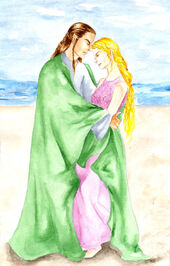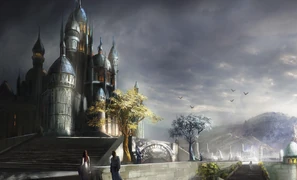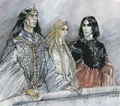Turgon was a Ñoldorin Elf of Gondolin, second son of Fingolfin, brother of Fingon, Aredhel, Argon, and father of Idril. In Middle-earth, Turgon was the King of Gondolin and the High King of the Ñoldor. For centuries of the First Age, Turgon remained successfully hidden from Morgoth until a betrayal from within Gondolin brought its downfall.
Biography[]

Turgon with his wife Elenwë before her death, by Marya Filatova
In Eldamar, Turgon was friendly with the sons of Finarfin and opposed Fëanor's plan to pursue Morgoth after the theft of the Silmarils, but eventually he chose to follow them to Middle-earth and became one of the exiles. His wife Elenwë was lost crossing the Helcaraxë,[2] but Turgon and his daughter Idril came to Nevrast, where he built Vinyamar and gathered to him one-third of the Ñoldor of Fingolfin and a large number of Sindar.[3]
In the year 50 of the First Age, Turgon was instructed by Ulmo to prepare a secret kingdom and was shown the hidden Vale of Tumladen in the Encircling Mountains. After 52 years of secret labor, Turgon led his people into Gondolin, where he ruled for over 500 years, largely ignoring the events of the Wars of Beleriand.[4][5]
About two hundred years after Gondolin was wrought, Turgon's sister Aredhel journeyed to meet with the Sons of Fëanor. She was lost, however, and returned with her son Maeglin a few years later. After the deaths of both Eöl and Aredhel, Turgon took Maeglin under his wing and made him the Lord of the House of the Mole. Maeglin secretly loved Turgon's daughter Idril, who rejected his advances.[6]
Aside from the misadventure of Eöl, the splendor of Turgon's reign in Gondolin was undisturbed until the Dagor Bragollach, when Turgon was brought his father's body by Thorondor. Two years later Thorondor brought him Húrin and Huor, whom he fostered for a year and then allowed to return to Dor-lómin. At this time, Turgon foresaw the doom of the Ñoldor, and he secretly sent mariners to try to obtain the mercy of the Valar.[7] None of these missions was successful and only one of the mariners, Voronwë, survived the Shadowy Seas paving the way for Tuor's coming to Gondolin.[8]

Turgon's citadel in Gondolin, by Nicolas Chacin
Turgon joined the Union of Maedhros with an army ten thousand strong and fought alongside his brother Fingon in the Nírnaeth Arnoediad, but the sacrifice of Húrin, Huor, and the Third House of the Edain enabled him to retreat without revealing the location of Gondolin.[9] When Tuor came to Gondolin in FA 496, Turgon welcomed him, but in his pride, he refused to follow the advice of Ulmo to flee to the Havens of Sirion. The full malice of Morgoth was now directed toward Turgon, the last of the House of Finwë to control a realm in Middle-earth. At last, aided by the treachery of Maeglin, Morgoth discovered the location of Gondolin, and Turgon was slain defending the city.[10]
Etymology[]
The first element tur of the name Turgon is a Sindarin word for "power, mastery".[11] His father-name was Turukáno, from túrë ("might, power") and káno ("commander").[12]
Character[]
As King of Gondolin, Turgon was described to be robed "in white with a belt of gold, and a coronet of garnets was upon his head".[13]
He was very much feared by Morgoth, and it is said in Valinor that Morgoth knew that from the House of Turgon would his ruin come. This holds true, as Turgon's grandson Eärendil was the one who indirectly caused his downfall, in the later War of Wrath.
House of Fingolfin[]
|
|
| Finwë |
| Indis | ||||||||||||||||||||||||||||||||||||||||||||||||||||||||||||||||||||||||||||||||||||||||||||||||||||||||||||||
|
|
|
|
|
|
|
|
|
|
|
|
|
|
|
|
|
|
| |||||||||||||||||||||||||||||||||||||||||||||||||||||||||||||||||||||||||||||||||||||||||||||||||
| Findis |
| Fingolfin |
| Anairë |
| Irimë |
| Finarfin | ||||||||||||||||||||||||||||||||||||||||||||||||||||||||||||||||||||||||||||||||||||||||||||||||||||||||||
|
|
|
|
|
|
|
|
|
|
|
|
|
|
|
|
|
|
|
|
|
|
|
| ||||||||||||||||||||||||||||||||||||||||||||||||||||||||||||||||||||||||||||||||||||||||||||
| Fingon |
| Turgon |
| Elenwë |
| Aredhel |
| Eöl |
| Argon | ||||||||||||||||||||||||||||||||||||||||||||||||||||||||||||||||||||||||||||||||||||||||||||||||||||||||
|
|
|
|
|
|
|
|
|
|
|
|
|
|
|
|
| |||||||||||||||||||||||||||||||||||||||||||||||||||||||||||||||||||||||||||||||||||||||||||||||||||
|
|
|
|
|
|
| Idril |
| Tuor |
| Maeglin | ||||||||||||||||||||||||||||||||||||||||||||||||||||||||||||||||||||||||||||||||||||||||||||||||||||||||
|
|
|
|
|
|
|
|
|
|
| |||||||||||||||||||||||||||||||||||||||||||||||||||||||||||||||||||||||||||||||||||||||||||||||||||||||||
|
|
|
|
|
|
|
|
| Eärendil |
| Elwing | ||||||||||||||||||||||||||||||||||||||||||||||||||||||||||||||||||||||||||||||||||||||||||||||||||||||||
|
|
|
|
|
|
|
|
|
|
|
|
|
|
| |||||||||||||||||||||||||||||||||||||||||||||||||||||||||||||||||||||||||||||||||||||||||||||||||||||
|
|
|
|
|
|
|
|
| Elrond |
| Elros | ||||||||||||||||||||||||||||||||||||||||||||||||||||||||||||||||||||||||||||||||||||||||||||||||||||||||
Gallery[]
 |
 |
 |
Translations[]
| Foreign Language | Translated name |
| Amharic | ጡርጎን |
| Arabic | تورغون (Turgon)
تورغون الحكيم (Turgon, the Wise) |
| Armenian | Տուրգոն |
| Assamese | টাৰ্গন |
| Belarusian Cyrillic | Тургон |
| Bengali | তুরগণ |
| Bulgarian Cyrillic | Тургон |
| Chinese (Hong Kong) | 特剛 |
| Georgian | ტურგონი |
| Greek | Τούργκον |
| Gujarati | તુર્ગન |
| Hebrew | טורגון |
| Hindi | तुर्गों |
| Japanese | トゥアゴン |
| Kannada | ತುರ್ಗಾನ್ |
| Kazakh | Тұргон (Cyrillic) Turgon (Latin) |
| Korean | 투르곤 |
| Kyrgyz Cyrillic | Тургон |
| Macedonian Cyrillic | Тургон |
| Malayalam | ടർഗൺ |
| Marathi | टुर्गोन |
| Mongolian Cyrillic | Тургон |
| Nepalese | टुर्गोन |
| Pashto | طورګون |
| Persian | تورگون |
| Punjabi | ਟੁਰਗਨ |
| Russian | Тургон |
| Sanskrit | टुर्गोन् |
| Serbian | Тургон (Cyrillic) Turgon (Latin) |
| Sindhi | ترگن |
| Sinhalese | ටුර්ගොන් |
| Tajik Cyrillic | Тургон |
| Tamil | டுர்கொந் |
| Telugu | తుర్గోన్ |
| Thai | ทัวร์กอน |
| Ukrainian Cyrillic | Турґон |
| Urdu | ٹورگاون |
| Uzbek | Тургон (Cyrillic) Turgon (Latin) |
| Yiddish | טורגאָן |
| King of Gondolin | ||
| Preceded by None |
Turgon | Succeeded by None, Kingdom destroyed and title abandoned |
| FA 104 - FA 510 | ||
| High King of the Ñoldor | ||
| Preceded by Fingon |
Turgon | Succeeded by Gil-galad |
| FA 473 - FA 510 | ||
References[]
- ↑ The History of Middle-earth, Vol. X: Morgoth's Ring, The Annals of Aman
- ↑ The Silmarillion, Quenta Silmarillion, Chapter IX: "Of the Flight of the Noldor
- ↑ The Silmarillion, Quenta Silmarillion, Chapter XIV: "Of Beleriand and its Realms"
- ↑ The Silmarillion, Quenta Silmarillion, Chapter XIII: "Of the Return of the Noldor"
- ↑ The Silmarillion, Quenta Silmarillion, Chapter XV: "Of the Noldor in Beleriand"
- ↑ The Silmarillion, Quenta Silmarillion, Chapter XVI: "Of Maeglin"
- ↑ The Silmarillion, Quenta Silmarillion, Chapter XVIII: "Of the Ruin of Beleriand and the Fall of Fingolfin"
- ↑ Unfinished Tales, Introduction, Part One, I: "Of Tuor and his Coming to Gondolin"
- ↑ The Silmarillion, Quenta Silmarillion, Chapter XX: "Of the Fifth Battle: Nirnaeth Arnoediad"
- ↑ The Silmarillion, Quenta Silmarillion, Chapter XXIII: "Of Tuor and the Fall of Gondolin"
- ↑ The Silmarillion, Appendix: Elements in Quenya and Sindarin names
- ↑ The History of Middle-earth, Vol. XII: The Peoples of Middle-earth, chapter 11: "The Shibboleth of Fëanor"
- ↑ The History of Middle-earth, Vol. II: The Book of Lost Tales Part Two, chapter 3: "The Fall of Gondolin"

